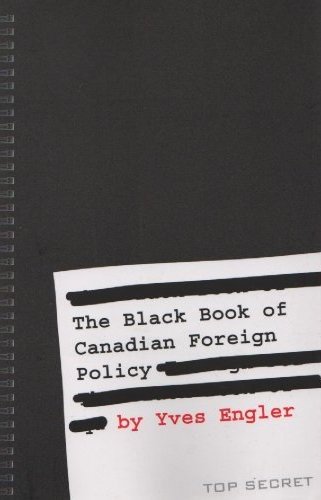Of all the pithy observations of what makes Canadians Canadian, my favourite is the quip that we are a people with a heightened sense of injustice — particularly when facing south. The accusation is of course that Canadians are quick to judge American imperialism, but we have a moral blind spot when it comes to our own actions.
In his latest book, The Black Book of Canadian Foreign Policy, Yves Engler has undertaken the ambitious task of fully illuminating that blind spot by cataloguing Canada’s crimes abroad. This is not a meagre task, given the obstacles confronting anyone who attempts a clear-sighted assessment of our foreign affairs. In comparison to the United States, there is a relative lack of critical analysis of our foreign policy. As well, there is the entrenched belief in our country’s benevolence which pervades not only the ideology of the Establishment but even some sections of the left.
Despite these potential barriers, Engler succeeds quite well, producing an extremely interesting and quite largely convincing book. Even those sections not so rigorously researched and argued are nonetheless stimulating throughout.
Structurally, the book is laid out somewhat like an encyclopedia, with headings not just for dozens of individual countries, but also entries for NATO, the Cold War and international institutions like the IMF. This format is very useful for readers who are already well versed on the subjects covered and want a Canadian angle. Doubtless due to the need for brevity, these terse thumbnails only rarely do justice to the larger context of the imperial machinations described, though valuable descriptions of Canada’s contributions to events are to be found in abundance.
Unfortunately, these minor stylistic flaws (among others) will likely keep this book off the shelves of public libraries, high schools and all but a few colleges. If so, that will be truly unfortunate, because Engler’s contribution deserves very wide exposure.
Since The Black Book is primarily a work which synthesizes a range of analyses, in evaluating it, one must consider the book’s bibliography while also asking how well that bibliography is rendered. In general, it is better on the first score than the second.
Engler deserves credit for reviving many worthy Canadian radical histories such as Levant’s Quiet Complicity (1986), McFarlane’s Northern Shadows (1989) and Scharfe’s Complicity (1996). Similarly, the findings of MiningWatch and several mining journalists get a well-deserved airing, as does the valuable work of the Coalition to Oppose the Arms Trade. However, the book would have benefited from more use of primary sources such as official publications and memoirs of people like Lester Pearson, Escott Reid or Paul Martin Sr. But, given the impressive amount of information which this dense book offers as it is, the lack is scarcely noticed.
In occasional entries, the book’s sources are decidedly shakier. Africa specialists will be disappointed that Engler relied on the highly speculative writing of Wayne Madsen to the neglect of far better informed observers like Alex de Waal, Mahmood Mamdani or Linda Melvern.
Although The Black Book offers convincing evidence that Canada’s foreign policy seldom meets the lofty ideals proclaimed by leaders and intellectuals, if anything the book undersells the argument. Frequently, Engler overlooks the most damning acts or neglects to draw important conclusions. As an example of the latter, though current CDS General Natynczyk’s involvement in planning the war in Iraq is noted, no mention is made that planning an aggressive war is a serious war crime.
While the section on Indonesia is hard-hitting, nowhere do we find the ugly fact that Canada’s Ambassador Shortliffe himself witnessed evidence of the Indonesian military’s ongoing genocidal attacks on civilians in 1978 when he visited East Timor to observe (rigged) elections. The ambassador’s report back to Ottawa mentioned no problems. Shortliffe’s visit to East Timor was of dubious value in any case, Canada having by then arrived at a policy of “accepting [the] reality of East Timor’s incorporation” into Indonesia, according to Shortliffe’s instructions from Foreign Affairs. And although Engler outlines many of SNC-Lavalin’s more egregious accomplishments around the world, he leaves out that company’s contract with the Indonesian government in the 1980s, the purpose of which was to select resettlement sites in Irian Jaya for thousands of landless farmers from Bali and Java, where government-sponsored evictions were rife.
In the case of Canada’s 1932 naval intervention in El Salvador, Engler omits Peter McFarlane’s description of Canada’s Admiral Brodeur, the expedition’s commander, discussing with Salvadorian ruler General Martinez the possibility that Canadian forces might fight alongside the dictator’s troops against Indian insurgents. Also, Brodeur himself saw evidence of executions of civilians and prisoners carried out by Salvadorian forces. One commander told Brodeur they had already killed 4,600 communists in what was the opening phase of La Matanza, a horrific massacre still remembered in that country. Brodeur himself dined with the dictator, while his underlings seethed with class revolt: “The lower decks were with the masses in El Salvador,” recalled one sailor aboard.
The book ends with a discussion of what can be done to change this immoral trend in Canada’s outward behaviour. This too is a stimulating, necessary conversation in which one hopes many people will take part, and in which the matters raised in this book will be widely considered, evaluated and, most importantly, acted upon.–Dave Markland




